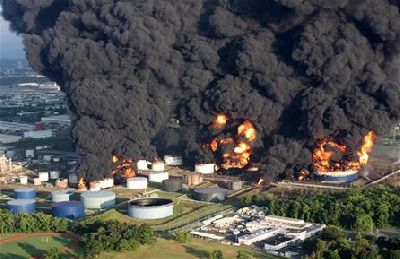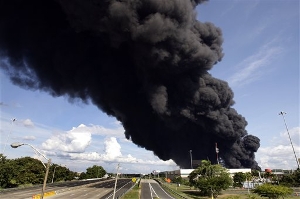Fuel storage tanks explode in Puerto Rico
Primary tabs
Fire crews worked for three days to contain a mammoth fire at a fuel storage facility run by the Caribbean Petroleum Corp. and owned by Gulf outside Puerto Rico's capital.


The explosion happened at 12:30 a.m. on October 22nd, and registered 2.8 on the Richtor scale, according to the Puerto Rico Seismic Network. It shook people out of bed across metropolitan San Juan, Puerto Rico's largest city, and shattered windows across the bay in colonial Old San Juan. Its cause has not yet been determined, and there are few reports coming out of the area, which was sealed off as the tanks burned.
Workers escaped the compound and no deaths were reported, but thousands of people living nearby were evacuated.
"The smoke is extremely toxic," said Jose Bartolomei, a state epidemiologist who monitors asthma. "An asthmatic patient will definitely hyper-react to this."
Adding to the danger is the presence of invisible gases such as carbon monoxide and sulfur, said Luis Antonio Ocasio, spokesman for the island's Environmental Quality Board.
Reports said the explosion and fire destroyed at least 18 of the oil facility’s 40 storage tanks, which contained products such as jet fuel, bunker fuel and gasoline. The tanks at Caribbean Petroleum hold about 10 percent of the gasoline consumed in Puerto Rico and supply gas to the 200 Gulf gas stations throughout the islands. The facility also included a 48,000 barrel-per-day refinery, but this was not in operation, according to Caribbean Petroleum. A company spokesman declined to say how much fuel was in the tanks at the time of the explosion.
Agents from the FBI and the U.S. Bureau of Alcohol, Tobacco, Firearms and Explosives are investigating to determine whether the explosion was an act of sabotage.
The governor estimates that the blaze has cost the island at least $6.4 million. Environmentalists say that it is an ecological disaster of unprecedented magnitude for Puerto Rico.
Caribbean Petroleum has a history of violating the federal laws that deal with the disposal of solid and hazardous wastes, according to an EPA spokeswoman.









